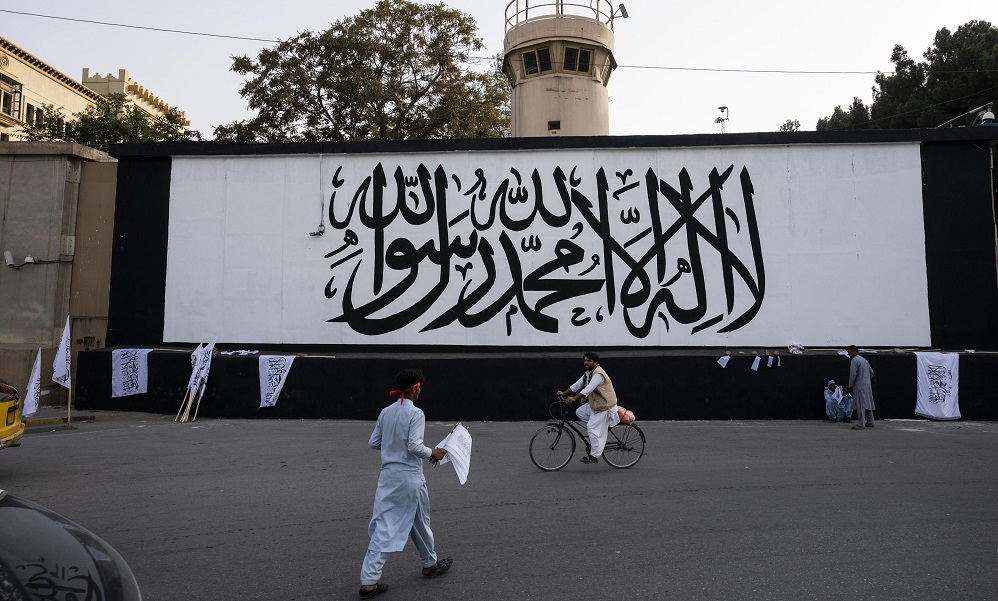Latest News
IEA says it is open to considering advice from its neighbors

The Islamic Emirate of Afghanistan (IEA) has urged the country’s neighbors to engage in bilateral talks with them in order to resolve common problems in a more coordinated way.
A spokesman for the Islamic Emirate, Zabiullah Mujahid, said that domestic issues concern Afghans but countries concerned with Afghanistan’s political structure can advise the IEA, which will consider suggestions.
However, he said that Afghans know best what is suited to them in terms of the formation of their government.
“We will not allow anyone to pose a threat to neighbors or other countries from Afghanistan. We are serious and committed in this,” said Mujahid.
“Another issue is that some countries have certain recommendations on the formation of government and its composition. We heard those which were in the form of advice and we will consider it.
“But we reiterate that Afghans know well who should be involved and how the government should be,” he said.
Political analysts, however, see Afghanistan’s engagement with its neighbors as a necessity to achieve global legitimacy.
It has been nine months since the Islamic Emirate came into power, but countries, especially Afghanistan’s neighbors, still have unilateral demands, critics have said.
IEA officials have made it clear that the new Afghan government attaches great importance to relations with its neighbors. In line with this, the IEA has called on neighboring countries to work at expanding relations with Kabul so that problems can be addressed jointly.
The formation of an inclusive government is one of the key conditions for the international community to recognize the ruling government of Afghanistan.
According to experts, so far the government has not been able to satisfy the international community and countries in the region.
Some religious scholars have said that the establishment of bilateral economic and diplomatic relations with countries is a basic need for the Islamic Emirate.
Although no country has officially stated that it recognizes the Islamic Emirate, Afghanistan has political representatives in Pakistan, Iran, Turkey, Russia, Uzbekistan and China.
Latest News
Girls’ education is a ‘vital issue’ for Afghanistan: Karzai

Former president Hamid Karzai said in a meeting with Iran’s ambassador and special representative, Hassan Kazemi Qomi, that education of girls was a “vital issue” for Afghanistan.
Karzai said he appreciated Iran’s cooperation and its standing with the Afghan people, especially Iran’s contributions to education in Afghanistan.
During the meeting, Karzai said peace and stability in the region are in the interest of all regional countries.
Latest News
Uzbekistan’s humanitarian aid arrives in Balkh

A shipment of humanitarian aid from Uzbekistan was handed over on Thursday to the local officials of Balkh province in the trade port of Hairatan.
Local authorities said the aid, which includes flour, oil, wheat, sugar and meat, has been handed over by Uzbekistan’s Surkhandarya governor to the governor of Balkh.
The governor of Surkhandarya stated the purpose of sending this aid was to support the people of Afghanistan and stressed the need for the development of good relations between the two countries.
Latest News
Afghanistan’s problems caused more damage to Pakistan than 3 wars with India: Durrani

Islamabad’s special envoy for Afghanistan Asif Durrani said on Wednesday that Pakistan has suffered more due to Afghanistan’s internal situation than Pakistan has suffered in three wars with India in terms of blood spilt and finances drained.
Durrani said at a one-day International Conference titled “Pakistan in the Emerging Geopolitical Landscape”, which was organized by the Institute of Strategic Studies Islamabad (ISSI) and the German Friedrich Ebert Stiftung (FES), that over 80,000 Pakistanis died in the two decades of the War on Terror and that his country was still counting its dead and injured.
“After the withdrawal of NATO forces, it was hoped that peace in Afghanistan would bring peace to the region. However, such expectations were short-lived,” he said.
He also stated that attacks by the Tehreek-e-Taliban Pakistan (TTP) militant group on Pakistan’s border areas increased by 65 percent, while suicide attacks increased by 500 percent.
“The TTP’s enhanced attacks on Pakistan while using Afghan soil have been a serious concern for Pakistan. Another worrying aspect is the participation of Afghan nationals in these attacks,” he said.
Durrani also said Pakistan had suffered geopolitically since the Soviet Union invaded the neighboring country.
“The post-9/11 world order has negatively impacted Pakistan. Apart from losing 80,000 citizens’ lives, including 8,000 law enforcement agency personnel, the country’s economic opportunity cost is estimated at $150 billion,” Durrani said.
Talking about the future outlook for Pakistan in the regional context, Durrani said that while “our eastern neighbor is likely to continue with its anti-Pakistan pursuits, the western border poses an avoidable irritant in the short to medium term.”
However, he said Pakistan can overcome its difficulties with Afghanistan, including the TTP challenge.
-

 Latest News4 days ago
Latest News4 days agoPakistan’s frontiers minister stresses ‘dignified’ return of Afghan refugees
-

 Regional3 days ago
Regional3 days agoIranian president lands in Pakistan for three-day visit to mend ties
-

 Climate Change4 days ago
Climate Change4 days agoMassive river flooding expected in China, threatening millions
-

 Latest News2 days ago
Latest News2 days agoRashid Khan named AWCC’s brand ambassador
-

 Latest News4 days ago
Latest News4 days agoChinese keen to invest in Panjshir-Kabul water conduit project
-

 World4 days ago
World4 days agoTwo Japan navy helicopters crash, one body found, 7 missing
-

 Sport3 days ago
Sport3 days agoKolkata beat Bengaluru by one run in IPL as Kohli fumes at dismissal
-

 Sport3 days ago
Sport3 days agoACL: Aino Mina 3-0 Istiqlal Kabul; Attack Energy 3-0 Khadim
























